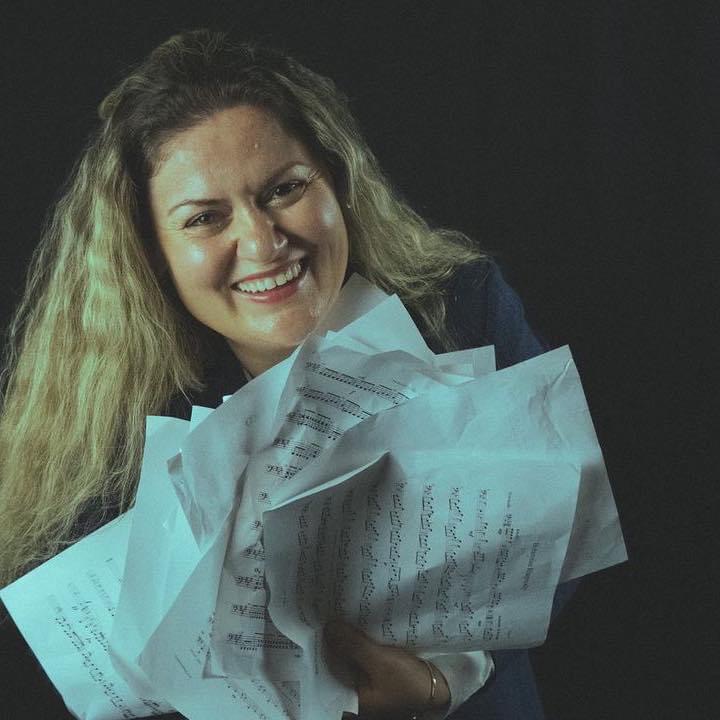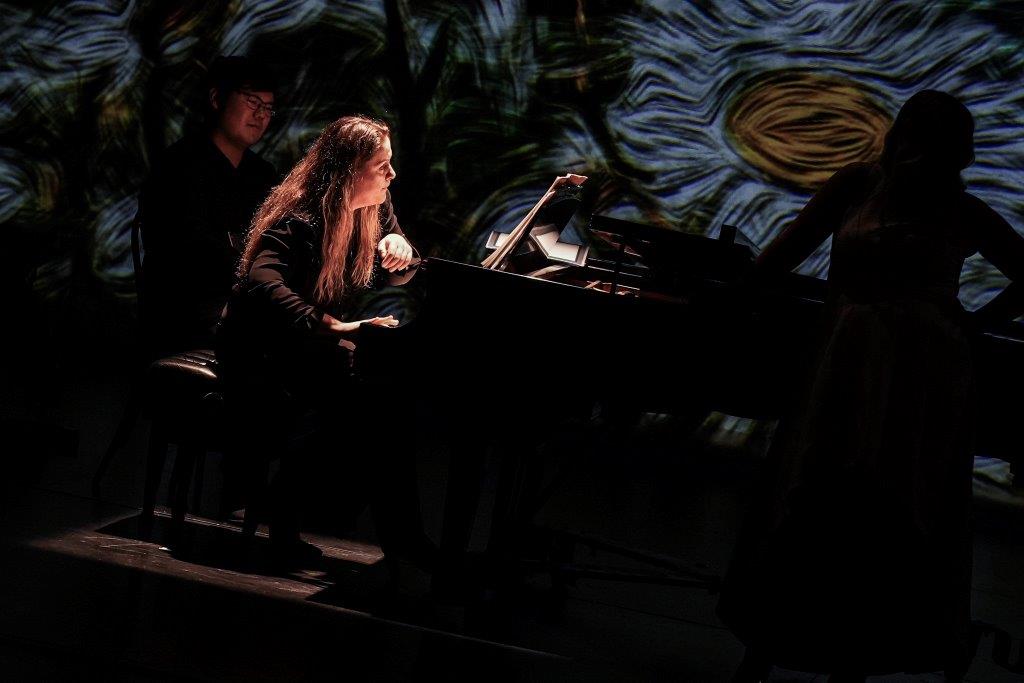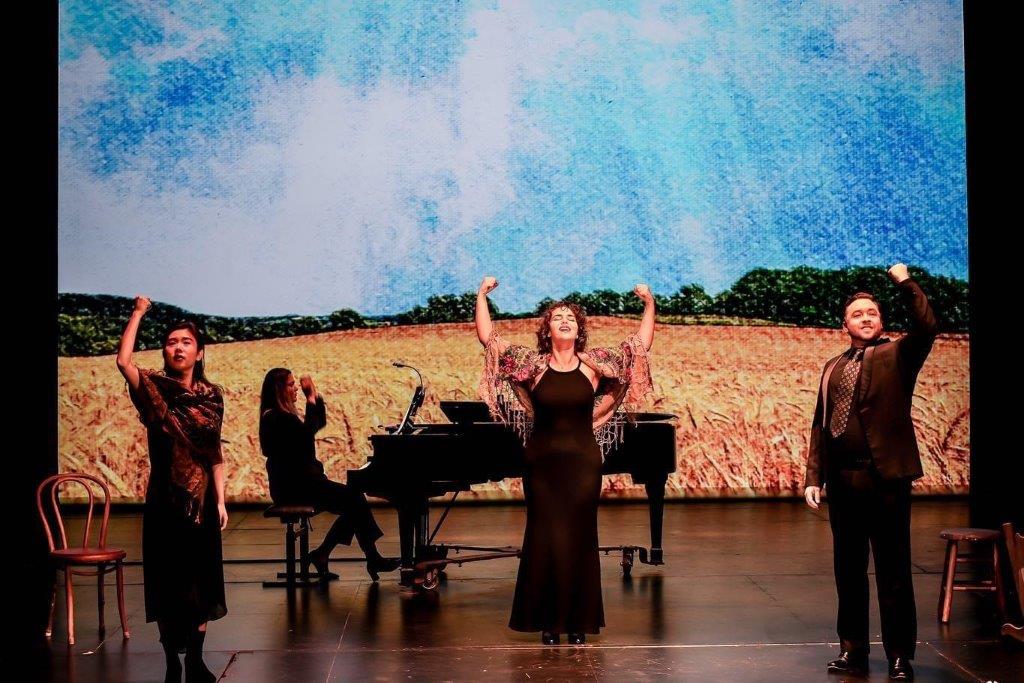
– Hello Ana. Several years have passed since you gave your first interview for the Russian Cultural Center in Austin. Please tell us what has changed in your life since then.
Hello Dmitriy! After our first interview, many changes happened in my life: I received a second master’s degree in opera coaching (I received my first master’s degree in performance/piano in 2011), entered doctoral studies at the University of Texas at Austin, gained experience working with music stars industry in the field of opera, tried herself as a subtitle operator in the show of Oscar nominee and winner of several Grammy awards Terence Blanchard. She also took conducting classes with the incomparably talented Maestro Khudyev. In terms of performing activities, over the past few years I have performed two world premiere operas.
– Please tell us about your profession and your work.
– As you already know, this semester I got a doctorate degree in music performance/opera coaching. Being an opera coach, you must have not only the skills of a pianist and accompanist, but also you need to be engaged with conducting, directing, and singing skills. We, opera coaches, prepare opera singers for the big stage, teach them a new role, work on correct diction and pronunciation, phrasing and correct breathing in a particular aria. In a word, we, the opera coaches, are the ones without whom the show will not take place. We, the soldiers of the invisible front.

– What interesting cases did you encounter in your work?
Being an opera coach and working with opera singers is already an interesting case! Singers are the most beautiful, amazing and wonderful people with a very deep inner world and fragile character. Once I had to work with a very famous star (we won’t name names). We were preparing for a very large festival, during which I was supposed to perform (accompany) several famous arias and French songs. So, on the eve of the festival, my singer broke up with her boyfriend, cried all night and showed up the next day with a shrunken voice. So, she could reach easily to a lower register, but her high pitches were flat. And we’re just about to go on stage, but we don’t get the tone… And then I need to come up with something, and there’s nothing left for me to do except transpose all the works one and a half tones lower. For those who have studied music, it is a familiar thing to switch from one key to another, which in theory means playing everything the same, but from a different note, while retaining the signs of the new key. In a word, continuous adventures!
– Which of your projects were most memorable, and why?
Just recently I played the world premiere of the opera Maria, written by one of our students, Josiah Garza. The boy dedicated this opera to his grandmother and her family drama. The opera was written for piano and small chamber ensemble.
As the main coach and the only pianist in this opera, I worked with both singers and the composer. The composer did not have operatic skills and very often wrote this or that theme in a very high tessitura, which did not allow the vocalists to show the beauty of their timbre. Throughout the entire process, I spent a lot of effort to get the desired result. The premiere had a great success! After the premiere, people at the university talked about this wonderful opera for a long time.

– Please tell us about cultural events at the University of Texas at Austin.
Austin hosts many events in the world of classical music. One of the upcoming events is the opera Queen of Spades by Tchaikovsky. I would like to say that the libretto (plot) of the opera differs from Pushkin’s Queen of Spades.
Tchaikovsky liked Herman’s character a lot, so he treated this character with empathy and understanding. If Pushkin in his work represents high society with elements of irony and sarcasm, with Tchaikovsky it’s the other way around. Herman appears before the viewer as a lonely and unhappy soul who wanders and wanders in search of happiness, without realizing that for him there is happiness – love for Lisa or for gambling?
But all this is much more interesting to see and hear with your own eyes. Therefore, come to our opera, preferably in the first two days, because you will want to see this wonderful spectacle again and you will also attend the next two performances. Most amazingly, the opera will be presented in Russian at the Butler Opera Center at the anniversary concert.
My teacher, director of the Butler Opera Center, Professor Tamar Sanikidze, and I took responsibility for Russian diction.
By the way, in one of the scenes the audience will have the opportunity to see me on stage. I will accompany duet of Lisa and Polina. This opera is very important for me, since I am one of the Russian diction coaches, I play chorus scenes at rehearsals, I will be the orchestra manager for the same opera, and, among other things, I will shine on stage. “He dances himself, sings himself, sells tickets himself” – so this is about me.
So, come to the Queen of Spades on April 19th and 26th at 7:30 pm, and April 21st and 28th at 4:00 pm McCullough Theater! It will be fun! I promise!
– As you know, Austin is considered the musical capital, please tell us about cultural and musical events not only at the university, but also in the city of Austin.
In addition to the Butler Opera Center, the Austin Opera and Ballet are very active in musical activities. Many theater companies come to Austin with various productions. For example, the Nutcracker ballet on Christmas Eve has already become a tradition in the cultural life of Austin. For connoisseurs of guitar music, there is the opportunity to visit the Austin Guitar Association, which hosts many concerts and guitar music events. I’m not even talking about pop concerts, which are held at the highest level.
– Please tell us about your professional plans for the future. What else would you like to tell us about yourself?
In addition to opera, I really enjoy teaching. In a future I am planning to be a founder of my own music studio in order to educate more than one generation of talented pianists. Recently Ijoined the MTNA (Music Teachers National Association), which gives me the opportunity to bring my students to the professional stage.
– What would you like to wish to Russian-speaking residents of Austin and Texas?
I would like to encourage you to invest as much time as possible in your children. Engage in their education, because our children are our everything!
Contact information:
Ana Moiseeva, Pianist
The University of Texas at Austin
College of Fine Arts, Butler School of Music
Facebook: https://www.facebook.com/AnnaMoiseeva87
